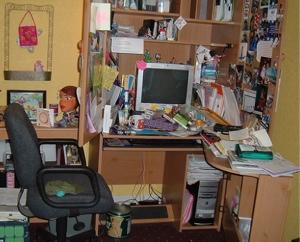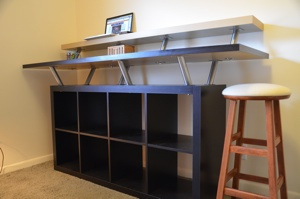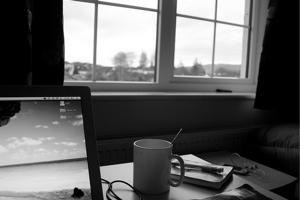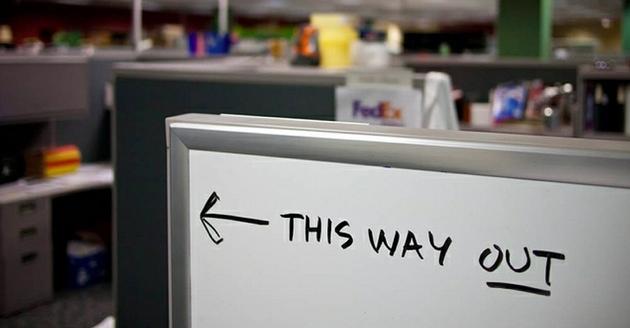If you’re stuck working in an office building somewhere, you might look at those who work from home as incredibly lucky. But anyone who has done so for any length of time can tell you that working from home isn’t as easy as it sounds. It means working in a house full of distractions and diversions, trying to ignore the dirty dishes, laundry, barking dogs, bored kids, and all manner of other things that would be perfectly reasonable ways to procrastinate if you didn’t have all that work that needs to get done.

Whether you’re a telecommuter for a large company or a freelancer working for clients all over the globe, the most important part of successfully working from home is a good home office. Where and how you choose to set yours up depends on the limitations of your home and your budget, but the experts agree that setting aside your own office space is essential.
1. Evaluate your work habits and needs.
Everyone’s different — one person’s concentration aid might be another’s distraction, and the things that make an inspiring office space to you might be incredibly annoying to someone else. So take a good look your work habits and figure out what works for you. Do you like things minimalist and Spartan or cozy and comfy? Do you like lots of artwork on the walls to inspire you, or do you prefer clean and clear swaths of color?
How you organize your office will also depend on the type of work you do. Do you accomplish all your daily tasks on the computer, or do you also need desk space to spread out papers or tasks? Do you have a lot of different tasks to keep track of at once, or are you mostly doing one thing at a time? A wide-open desk, lots of cubbyholes for organizing tools, or a multi-level inbox might be just the thing.
2. Declutter for maximum concentration.

Clutter is the bane of a productive office. Even if you tell yourself that you can ignore it, being surrounded by piles of paper and other clutter reminds your brain that you have dozens of other things to do, and part of your subconscious mind is thinking about those other incomplete tasks rather than the processes at hand.
The best way to deal with clutter is to make sure that everything has a home and that it lives there. Office supplies should have somewhere to be put away. Mail and other papers should have a specific filing system for before and after they’re dealt with. Knickknacks and other bits and bobs should generally not be kept on the desk.
3. Manage intentional distractions.
Distractions aren’t entirely a bad thing, despite everything we just said about clutter. The trick is to manage them so that you use them intentionally. Research has shown that taking short breaks actually increases productivity, and sometimes that distraction is just what your brain needs to make intuitive leaps and solve problems.
Musical instruments, art supplies, and physical, console, or computer-based games — whatever your distraction of choice, keep it accessible but not easily so. You want to be able to access the brain-boosting power of distraction without, well, letting it distract you!
4. Invest in quality furniture and peripherals.

You’re going to be using your office for 40 hours a week or more, it’s worth investing in quality products to put in it. While it might be tempting to just use whatever old chair, desk, or table lamp you have around the house, your life will be much easier if you actually do some research and take the time to get what works for you.
A comfortable, ergonomic work chair that’s properly sized to fit both you and your desk is essential. An ergonomic keyboard and mouse can be very helpful, and you might also want to try a buying (or building!) a standing desk to use instead of or in addition to your traditional desk.
5. Set the mood and environment.

Use music, lighting, color, and other decor to make your home office somewhere you’ll enjoy spending time. Invest in some decent speakers, and create playlists of different types of music for different tasks. For some things, you might want classical; for others, techno.
Try to arrange your office so that you make the most of natural light. You don’t want glare to make reading your screen difficult, but most people find natural light and fresh air to be energizing. Houseplants can also brighten up a room and vastly improve air quality and concentration.
Do what works for you
The most important thing to remember about organizing your home office is that everyone has unique needs and desires. What works for your coworker might not work for you, and you should feel free to tweak and adjust any advice to your own specifications. You’re the one who has to work here, after all!
This story originally appeared on Tecca. More from Tecca:
Productivity Guide: 38 ways you can get more done with technology
Ask Tecca: How much space do I need for a home office?
11 DIY desks for your home office
Become a Saturday Evening Post member and enjoy unlimited access. Subscribe now




Comments
Being a Newbie at writing and finally getting my own office, I find this article very helpful. My office looks like picture #2. I need to declutter.